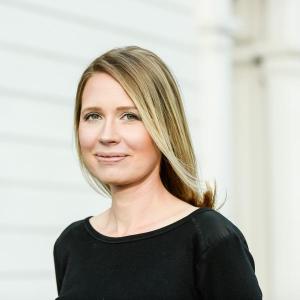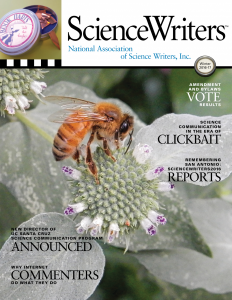Veteran science journalist Erika Check Hayden, senior reporter for Nature and a longtime lecturer in the science communication program at the University of California, Santa Cruz, became the program’s third director in January.
Check Hayden was selected by a committee of UCSC faculty and alumni after a national search. She succeeds current director Robert Irion, who is retiring from the university after leading the program for 10 years.
“Erika brings great skills and talent to this role, with more than 15 years of experience in science journalism across print, digital and multimedia formats,” says Paul Koch, dean of the Physical and Biological Sciences Division at UCSC.
“I believe that this is one of the most exciting and hopeful eras that science journalism has ever seen,” Check Hayden says. “I say this both as a science journalist myself, and as an instructor for the past six years at the SciCom program, where I have seen many graduates begin to shape our field’s future. Recent years have brought serious change and challenge to our discipline. But the ever-growing array of new initiatives in science journalism, producing content across numerous formats, and in many cases drawing upon the talent and leadership of SciCom alumni, evinces the robust health of science journalism today.“There is no more exhilarating calling that I can imagine than preparing enthusiastic, gifted students for world-changing careers in this field.”
Check Hayden earned her bachelor’s degree in biology at Stanford University, where she wrote for the Stanford Daily and the Stanford Alumni Magazine. Her first job was as a science, health, and breaking news reporter for Newsweek in New York, where she was part of the team that covered 9/11. In 2001 she was hired to join the news and features team at Nature. She worked for five years at the U.S. headquarters for Nature in Washington, D.C., and since 2006 she has been based in San Francisco. She covers trends, ethics, and research in biomedicine and the life sciences for the journal, as well as California news.
Check Hayden received funding from the Pulitzer Center for Crisis Reporting to travel to Sierra Leone in late 2014 to report first-hand on the outbreak of the Ebola virus for Nature and Wired. She covered the country’s response to the crisis from the front lines, focusing on the brave and daunting work of health-care providers — including an international team of doctors and scientists that remained in the country at grave personal risk — and on the impacts of thousands of deaths in Sierra Leone on families and on pregnant women. Her coverage earned widespread acclaim, including three awards from the Association of Health Care Journalists. An interview of Check Hayden about this reporting experience, by SciCom alumna Laurel Hamers (class of 2016) is available at bit.ly/2jcyA8M.In 2010, Check Hayden began teaching for the SciCom program in a course that she created, leading students through the dynamic and often fraught world of social media and its central role in science journalism today. Under her guidance, Santa Cruz students have made key national connections with editors, developed their voices as bloggers, and cultivated an online presence that helps them find and report stories.
The director’s search committee was chaired by Doug Kellogg, professor of molecular, cell, and developmental biology. Members were Christina Ravelo, professor of ocean sciences; Anthony Aguirre, professor of physics; Ken Doctor, former UC Santa Cruz Foundation president and noted media analyst at Newsonomics; and Kathleen Wong, a 1999 SciCom graduate and principal publications coordinator for the UC Natural Reserve System. The committee received input from other SciCom lecturers, a panel of local program alumni, and the program’s most recently graduated students.
Founding director John Wilkes, who earned his Ph.D. in English literature from UC Santa Cruz, established the Science Communication Program in 1981. Wilkes served as director for 25 years. Irion, a freelance journalist in the physical sciences and former contributing correspondent at Science, was a student under Wilkes in the SciCom class of 1988. He began teaching magazine journalism in the program in 2000 and became director when Wilkes retired in 2006. He will remain involved with the program as director emeritus.
(Source: UC Santa Cruz news release)
(NASW members can read the rest of the Winter 2016-17 ScienceWriters by logging into the members area.) Free sample issue. How to join NASW.


